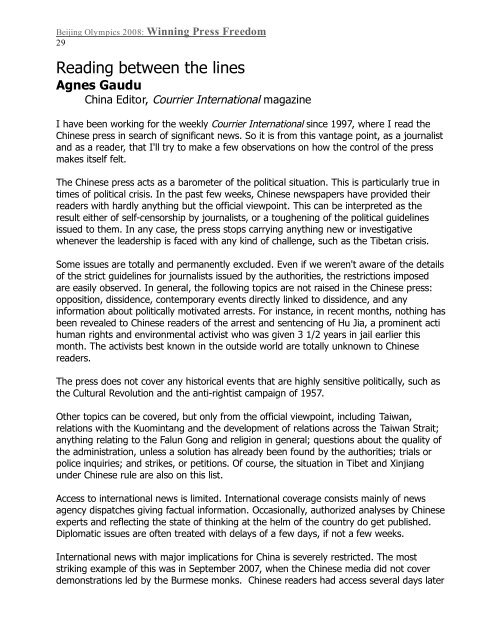Beijing Olympics 2008: Winning Press Freedom - World Press ...
Beijing Olympics 2008: Winning Press Freedom - World Press ...
Beijing Olympics 2008: Winning Press Freedom - World Press ...
Create successful ePaper yourself
Turn your PDF publications into a flip-book with our unique Google optimized e-Paper software.
<strong>Beijing</strong> <strong>Olympics</strong> <strong>2008</strong>: <strong>Winning</strong> <strong>Press</strong> <strong>Freedom</strong><br />
29<br />
Reading between the lines<br />
Agnes Gaudu<br />
China Editor, Courrier International magazine<br />
I have been working for the weekly Courrier International since 1997, where I read the<br />
Chinese press in search of significant news. So it is from this vantage point, as a journalist<br />
and as a reader, that I'll try to make a few observations on how the control of the press<br />
makes itself felt.<br />
The Chinese press acts as a barometer of the political situation. This is particularly true in<br />
times of political crisis. In the past few weeks, Chinese newspapers have provided their<br />
readers with hardly anything but the official viewpoint. This can be interpreted as the<br />
result either of self-censorship by journalists, or a toughening of the political guidelines<br />
issued to them. In any case, the press stops carrying anything new or investigative<br />
whenever the leadership is faced with any kind of challenge, such as the Tibetan crisis.<br />
Some issues are totally and permanently excluded. Even if we weren't aware of the details<br />
of the strict guidelines for journalists issued by the authorities, the restrictions imposed<br />
are easily observed. In general, the following topics are not raised in the Chinese press:<br />
opposition, dissidence, contemporary events directly linked to dissidence, and any<br />
information about politically motivated arrests. For instance, in recent months, nothing has<br />
been revealed to Chinese readers of the arrest and sentencing of Hu Jia, a prominent acti<br />
human rights and environmental activist who was given 3 1/2 years in jail earlier this<br />
month. The activists best known in the outside world are totally unknown to Chinese<br />
readers.<br />
The press does not cover any historical events that are highly sensitive politically, such as<br />
the Cultural Revolution and the anti-rightist campaign of 1957.<br />
Other topics can be covered, but only from the official viewpoint, including Taiwan,<br />
relations with the Kuomintang and the development of relations across the Taiwan Strait;<br />
anything relating to the Falun Gong and religion in general; questions about the quality of<br />
the administration, unless a solution has already been found by the authorities; trials or<br />
police inquiries; and strikes, or petitions. Of course, the situation in Tibet and Xinjiang<br />
under Chinese rule are also on this list.<br />
Access to international news is limited. International coverage consists mainly of news<br />
agency dispatches giving factual information. Occasionally, authorized analyses by Chinese<br />
experts and reflecting the state of thinking at the helm of the country do get published.<br />
Diplomatic issues are often treated with delays of a few days, if not a few weeks.<br />
International news with major implications for China is severely restricted. The most<br />
striking example of this was in September 2007, when the Chinese media did not cover<br />
demonstrations led by the Burmese monks. Chinese readers had access several days later





